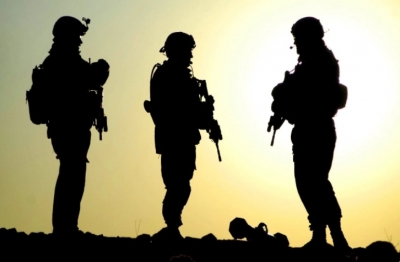IS in Afghanistan giving nightmares to biggest military power in world
By IANS | Published: August 25, 2021 07:27 PM2021-08-25T19:27:03+5:302021-08-25T19:40:15+5:30
New Delhi, Aug 25: Painful images of the terror attack on a gurudwara in Kabul on March 26 last ...

IS in Afghanistan giving nightmares to biggest military power in world
New Delhi, Aug 25: Painful images of the terror attack on a gurudwara in Kabul on March 26 last year, which left 25 people from the minority Sikh-Hindu community in Afghanistan dead, are still fresh in the public memory. The terrorist group which had taken responsibility for the heinous attack was the Islamic State in Iraq and the Levant—Khorasan Province (also called as IS-KP, ISIL-KP, ISIL-K or ISIS-K) - the same Afghan affiliate of Da'esh which is now becoming a big nightmare for the United States ahead of the August 31 deadline to finish evacuations from Afghanistan.
Speaking on the ongoing evacuation efforts in Kabul, US President Joe Biden said that he is mindful of the "increasing risks" and "real and significant challenges" that he has been briefed on and need to take into consideration while executing the largest airlift in US history.
"The longer we stay, starting with the acute and growing risk of an attack by a terrorist group known as ISIS-K, an ISIS affiliate in Afghanistan — which is the sworn enemy of the Taliban as well — every day we're on the ground is another day we know that ISIS-K is seeking to target the airport and attack both U.S. and Allied forces and innocent civil," Biden said Tuesday night.
The world's most powerful country saying that the "threat from ISIS-K is real" will however not take people who have followed the rise of IS-KP in Afghanistan by surprise.
Only last Thursday, External Affairs Minister S Jaishankar had expressed India's concerns on how the ISIL (Daesh) continues to pose a critical threat to international peace and security and its affiliates are growing in strength.
"In our own immediate neighbourhood, ISIL-Khorasan (ISIL-K) has become more energetic and is constantly seeking to expand its footprint. This should be taken seriously. Events unfolding in Afghanistan have naturally enhanced global concerns about their implications for both regional and international security," Jaishankar had said during his address at the UNSC Briefing on 'Threats to International Peace and Security caused by Terrorist Acts'.
Several analysts had already suggested that the Taliban's seizure of power would create an environment that allows extremist groups, including Da'esh, to establish a greater presence in Afghanistan.
Security reports had indicated that much before the Taliban takeover of capital Kabul, Da'esh in Afghanistan had increased its efforts to regroup and rebuild by prioritizing the recruitment and training of new supporters, including from Iraq, the Syrian Arab Republic and other conflict zones.
Taking advantage of the Covid-19 pandemic and intra-Afghan negotiations, it was not just the Taliban but also the IS-KP which expanded its presence in several provinces and strengthened its positions in and around Kabul, from where it launched attacks against different groups in Afghan society.
Last month, a UN Security Council report on the threat posed by ISIL had member states estimating that IS-KP currently controls between 500 and 1,500 fighters in Afghanistan and that these figures "may rise to as many as 10,000 in the medium term", making Afghanistan a haven for terrorist activity.
The terror outfit has staged a comeback after suffering leadership, human and financial losses during 2020 when it came under sustained pressure in its strongholds in eastern Afghanistan.
"Reportedly, over 1,400 ISIL-KP fighters and affiliates have surrendered since October, among them women and children. While ISIL-KP was largely expelled from Nangarhar Province in November 2019, it reportedly continues to have a presence in pockets of western Kunar Province," a UNSC report had said in March 2020.
However, IS-KP rebuilt and strengthened the group by attracting intransigent Taliban and other militants who rejected the agreement between the United States and the Taliban and joined the Da'esh affiliate after "feeling alienated or threatened" by developments in the Afghan peace process. It soon started targeting the minorities, civil society actors, government employees and personnel of the Afghan National Defence and Security Forces.
It is the same group which had also recently claimed the responsibility for the brutal attack against humanitarian group HALO Trust in Baghlan Province on June 8 in which 10 deminers were killed and 16 injured.
Quite obviously, both - the UN and the US - know that the IS-KP now has the potential for conducting future attacks, including even targeting the ongoing evacuation efforts in Kabul.
As the White House Press Secretary Jen Psaki put it last night: "The threat from ISIS-K is real. The possibility of a deterioration of coordination with the Taliban is real. Putting our service members at risk is real."
Disclaimer: This post has been auto-published from an agency feed without any modifications to the text and has not been reviewed by an editor
Open in app